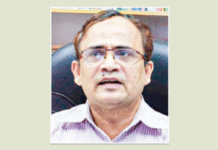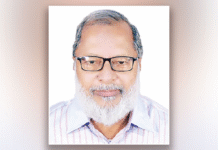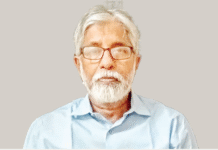TBS
Traders across the country have called on the authorities to come to a solution that does not wipe out their businesses overnight. They say they are not fighting the concept of NEIR, rather, they are fighting the way it is being introduced

After years of delays and uncertainty, Bangladesh is finally set to activate the National Equipment Identity Register (NEIR) on 16 December.
The government presents the system as a major step towards order and accountability in the mobile handset market.
But in markets across the country, traders have read the situation differently, warning that without urgent policy reforms, NEIR will concentrate power in the hands of a few large importers, restrict choice for consumers, and push thousands of small businesses towards closure.
The situation escalated further when the Detective Branch (DB) of the Dhaka Metropolitan Police picked up a representative of the Mobile Business Community, Bangladesh (MBCB) the night before a scheduled press briefing, along with a journalist.
The reservations raised by mobile shop owners are not entirely baseless: exorbitant prices caused by high taxes on official phones puts them out of the reach of most consumers in Bangladesh.
What purpose does the NEIR serve?
The NEIR was first planned during the previous government’s tenure to curb illegal handset imports, strengthen national security and reduce phone thefts. But technical problems, political hesitation and shifting priorities kept the project suspended. Now the interim government has decided to move ahead with a hard deadline.
From 16 December, every handset on Bangladesh’s mobile networks will be checked against a central database. Devices already in use will be registered automatically. Phones purchased abroad or received as gifts will require special registration within 30 days of arrival.
IMEI numbers will be matched with user information. A registered SIM card will be tied to a specific handset. If the pairing changes, the phone will lose network access until the new combination is verified.
To the authorities, this is a basic governance tool. It closes the door on cloned IMEIs, large-scale smuggling operations, refurbished phones with false identities, and criminal activity that depends on untraceable devices.
Another important aspect of NEIR is that it also promises higher revenue for the government by shutting down the long-standing trade in tax-evaded phones.
Business community’s anxiety and government’s crackdown
Traders across the country have called on the authorities to come to a solution that does not wipe out their businesses overnight. They say they are not fighting the concept of NEIR, rather, they are fighting the way it is being introduced.
They argue that centralised control, combined with existing tax rules, will place the entire market in the hands of a few dominant groups.
MBCB has led a series of protests and press briefings. Its president, Mohammad Aslam, said that traders have been treated as if they are obstacles.
“We do not want to obstruct the implementation of the NEIR system. We want it to be restructured. If the authorities act as the previous authoritarian government did, it will harm us. Allow us to work. Do not push us into unemployment,” he said.
Retailers fear a repeat of policies that strengthened one set of commercial interests at the expense of others.
The industry’s trust in the authorities weakened further after two late-night detentions last week. A business leader and a journalist were taken from their homes as they helped organise a press conference about NEIR. Both were released the next morning in the face of public criticism.
But DB justified the detention of Sumash Tech CEO and MBCB general secretary Abu Sayeed Piash, with its additional commissioner saying, “This organisation [MBCB] has taken a stand against this positive decision of the government… You yourselves consider — what is their intention? Who benefits if the market for illegal or stolen phones remains open?”
Allegations circulated that the detention was done under the instruction of Faiz Ahmad Taiyeb, the Special Assistant to the Chief Adviser for ICT and Telecommunications, accusations that he denied.
Earlier, through a press release on 19 November, Taiyeb said, “No mobile trader or shop owner is being harmed. They will sell devices that are produced domestically or imported legally. Phones brought in illegally will no longer be allowed.”
He also accused criminal networks of producing phones with cloned IMEI numbers and using various forms of smuggling. He said these groups were trying to stop NEIR for their own benefit.
“The government insists that NEIR targets illegal traders, not ordinary shop owners. But the late-night detention has created a climate of mistrust. Many see echoes of earlier political periods where dissent was met with force,” he added.
Will NEIR lead to a monopolised market?
The structure of the handset market has been uneven for years. High taxes have played a major role. Local assemblers pay between 1-17% tax. On the contrary, fully manufactured imported phones face up to 57% tariffs.
We do not want to obstruct the implementation of the NEIR system. We want it to be restructured. If the authorities act as the previous authoritarian government did, it will harm us. Allow us to work. Do not push us into unemployment.
These high taxes were intended to incentivise a domestic industry. Instead, it produced a landscape where consumers have limited choice and where demand often shifts to grey channels.
Brands release dozens of smartphone models globally each year; only a handful reach Bangladesh officially.
Xiaomi, for example, assembled only three to four models locally in 2024, while dozens of its other devices are widely popular abroad. Samsung assembles some mid-range models in Bangladesh but does not assemble most of its flagship phones.
For the consumers that seek to get their hands on a device that is not assembled locally, they have to buy officially imported ones at a significantly higher price.
Phones from brands like Apple, Huawei, and Nothing face the full tax burden because there are no factories here.
Apple does not regard Bangladesh as a large enough market to justify local production. But according to users, it is absurd to pay twice as much compared to our neighbours for an iPhone.
The result is predictable — grey-channel imports become attractive, not only because they are cheaper, but because they offer models that are otherwise unavailable.
NEIR will cut off this supply. But without tax reform, it will not remove the underlying demand that created the unauthorised market in the first place.
Furthermore, traders warn that NEIR, combined with restrictive import rules, will tilt the market towards a small circle of companies.
Importers must now provide documentation from the original manufacturer. Small and medium traders say this is impossible in practice. Many global brands do not sign direct contracts with small retailers. As a result, only the largest groups will obtain permission to import.
This is where traders see the risk of monopolies. Local manufacturers want NEIR to start immediately. Small importers want a transition period that allows them to survive.
They argue that the new rules will give manufacturers the power to set prices without meaningful competition. They also say that they cannot sell all their current stock before 16 December, and that it is unfair to penalise shipments that have already cleared customs.
What policies must address now
Countries such as India, Pakistan, Turkey, Indonesia, and Nepal, among others, also have mandatory IMEI registration policies in place as a tool to fight phone theft, counterfeit devices and network fraud. So, Bangladesh’s step towards this policy is not out of the ordinary.
At this point, all stakeholders agree on the notion of NEIR as a necessary system for a modern telecom sector.
But for it to be beneficial for all the parties — consumers, business owners, companies, and the government — it requires policy changes that address the economic structure beneath it.
Firstly, the business community seeks reduction of import tax from 57% to a reasonable and competitive level with that of the neighbouring countries.
Secondly, the import process must open up. The market cannot depend on one or two groups. Traders must have a path to legal importation. Without this, NEIR will create a controlled market where prices rise and choices shrink.
There are also apprehensions about this additional regulation opening up new avenues of corruption for unscrupulous government officials.
Taiyeb has said that the government has requested a reduction in duties. He has also said that local manufacturers have been asked informally to lower prices. These steps are meaningful, but the window for reform is narrow. Words must turn into policy before 16 December.
Aslam and other traders said they want dialogue, not confrontation. “We respectfully request the government to pause this system, bring us to the discussion table, consider our proposals fairly, and reach a balanced decision,” he said.









